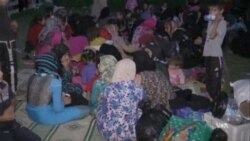WASHINGTON —
Conflicts in Iraq, Ukraine and Syria have created waves of refugees, drawing renewed attention to the large number of people who have been displaced for years. As the global community observes World Refugee Day on Friday, the number of displaced people has grown to more than 45 million - the highest level in the past two decades. Armed conflicts remain the dominant cause.
The number of refugees and internally displaced people in Iraq is growing. Iraqis who fled their homes after the 2003 allied invasion were joined in recent years by Syrians. Large-scale displacement has resumed with Sunni insurgent attacks in Iraq's north. Many ethnic Turkmen have left the city of Tal Afar.
"We were really afraid. We were afraid that a bomb would hit us or something, that something would happen to us. That's why we left," said one Turkmen fleeing the city.
Members of the Iraqi Turkmen Front say they will fight back.
"The Turkmen are in a difficult situation in Tal Afar. An estimated 150,000 people have fled. They need help. They will never forget what is happening," said the front’s Kasim Kar.
Syrian refugees in Jordan, Turkey and Lebanon are beginning to lose hope of ever returning home. Some of the children born there have never seen their country of origin. The head of the United Nations refugee agency, Antonio Guterres, visited some of the overcrowded camps this week.
"We have only 20 percent of the Syrian children in Lebanon in formal education, in formal schools where they can get a diploma, where they can use to move ahead in their lives. So, it's very little what we are doing. We need much more support from the international community for Syrian refugees, but also much more support for a country like Lebanon, for Jordan - countries that are facing an enormous challenge," said Guterres.
Countries near conflict zones that host large groups of refugees can find caring for them a significant burden. Guterres has repeatedly called for more donations from developed countries.
"An attitude of compassion and solidarity from the international community in relation to the Syrian refugees and to the countries hosting them is needed more than ever. And what the international community is doing is very little compared with the suffering and the needs of the people we met, namely those that we met today," he said.
While donors have difficulty satisfying the needs of existing refugees, new conflicts create new waves of displaced people. About 90,000 people have fled Pakistan's military offensive against militants in North Waziristan this month.
"We fled because of the bombardment. When the jets started bombing, and the gunship helicopters started bombing all over the place, we decided to flee," said one resident.
According to the United Nations, during the last year alone, someone was forced to abandon his or her home every four seconds. But figures reveal only one aspect of this human tragedy. Conflict tears apart the lives of thousands of families. Nearly half of all refugees are below the age of 18, and a growing number are fleeing on their own.
The number of refugees and internally displaced people in Iraq is growing. Iraqis who fled their homes after the 2003 allied invasion were joined in recent years by Syrians. Large-scale displacement has resumed with Sunni insurgent attacks in Iraq's north. Many ethnic Turkmen have left the city of Tal Afar.
"We were really afraid. We were afraid that a bomb would hit us or something, that something would happen to us. That's why we left," said one Turkmen fleeing the city.
Members of the Iraqi Turkmen Front say they will fight back.
"The Turkmen are in a difficult situation in Tal Afar. An estimated 150,000 people have fled. They need help. They will never forget what is happening," said the front’s Kasim Kar.
Syrian refugees in Jordan, Turkey and Lebanon are beginning to lose hope of ever returning home. Some of the children born there have never seen their country of origin. The head of the United Nations refugee agency, Antonio Guterres, visited some of the overcrowded camps this week.
"We have only 20 percent of the Syrian children in Lebanon in formal education, in formal schools where they can get a diploma, where they can use to move ahead in their lives. So, it's very little what we are doing. We need much more support from the international community for Syrian refugees, but also much more support for a country like Lebanon, for Jordan - countries that are facing an enormous challenge," said Guterres.
Countries near conflict zones that host large groups of refugees can find caring for them a significant burden. Guterres has repeatedly called for more donations from developed countries.
"An attitude of compassion and solidarity from the international community in relation to the Syrian refugees and to the countries hosting them is needed more than ever. And what the international community is doing is very little compared with the suffering and the needs of the people we met, namely those that we met today," he said.
While donors have difficulty satisfying the needs of existing refugees, new conflicts create new waves of displaced people. About 90,000 people have fled Pakistan's military offensive against militants in North Waziristan this month.
"We fled because of the bombardment. When the jets started bombing, and the gunship helicopters started bombing all over the place, we decided to flee," said one resident.
According to the United Nations, during the last year alone, someone was forced to abandon his or her home every four seconds. But figures reveal only one aspect of this human tragedy. Conflict tears apart the lives of thousands of families. Nearly half of all refugees are below the age of 18, and a growing number are fleeing on their own.





